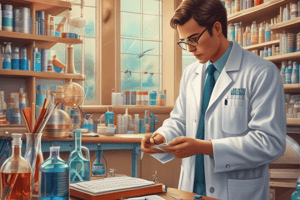Podcast
Questions and Answers
Which of the following purposes and functions do laboratorians serve through clinical pathology & laboratory medicine? (Select all that apply)
Which of the following purposes and functions do laboratorians serve through clinical pathology & laboratory medicine? (Select all that apply)
- Confirming or rejecting a diagnosis (correct)
- Detecting disease through screening (correct)
- Administering medication
- Providing guidelines in patient management (correct)
Which factor is NOT a cause of cell malfunction?
Which factor is NOT a cause of cell malfunction?
- Destruction by trauma
- Abundant oxygen supply (correct)
- Genetic deficiency of an enzyme
- Insufficient nutrients
What does POCT stand for?
What does POCT stand for?
Point-of-Care Testing
Which substances are categorized as metabolites?
Which substances are categorized as metabolites?
Electrochemical methods are ideal for the measurement of serum proteins and amino acids.
Electrochemical methods are ideal for the measurement of serum proteins and amino acids.
What does 'STAT' mean in lab requests?
What does 'STAT' mean in lab requests?
Which type of glass is resistant to heat, corrosion, and thermal shock?
Which type of glass is resistant to heat, corrosion, and thermal shock?
What is the purpose of a volumetric pipet?
What is the purpose of a volumetric pipet?
Which type of water is purified and suitable for reagent and standard preparation?
Which type of water is purified and suitable for reagent and standard preparation?
Which of the following is not a characteristic of polyolefins?
Which of the following is not a characteristic of polyolefins?
Flashcards are hidden until you start studying
Study Notes
Purpose and Function of Laboratorians
- Essential in clinical pathology and laboratory medicine.
- Aid clinicians in confirming/rejecting diagnoses.
- Provide guidelines for patient management and establishing prognosis.
- Facilitate disease detection through screening.
- Monitor follow-up therapy effectiveness.
Clinical Chemistry Overview
- Focuses on biochemical processes related to health and disease.
- Involves measuring constituents in body fluids/tissues for disease diagnosis.
- Interdisciplinary fields: Biochemistry, Pharmacology, Endocrinology, Toxicology, Immunology, Analytical Chemistry, and Instrumentation.
Cell Malfunctions
- Easier to detect malfunction than determine causes.
- Causes include trauma, genetic enzyme deficiencies, nutrient/blood/oxygen insufficiencies, malignancy, waste accumulation, and control system failures.
Point-of-Care Testing (POCT)
- Near-patient testing used in various healthcare settings.
- Addresses acute patient needs with portable analyzers, glucometers, and other devices.
- Enables rapid analysis for immediate clinical decision-making.
Categories of Measured Substances in Serum
- Functioning Substances: Glucose, electrolytes, proteins, hormones, vitamins.
- Metabolites: Urea, creatinine, bilirubin - waste products being cleared.
- Cell Damage Indicators: Enzymes like ALT, AST, CK, ferritin.
- Drugs and Toxins: Therapeutic drugs, substances of abuse, poisons.
Laboratory Tests
- Chemical tests can be direct/indirect or employ colorimetric and electrochemical methods.
- Degradative tests use enzymatic processes for measurement of activity.
- Multi-method approaches enhance accuracy in analyses.
Lab Test Priority Levels
- "STAT": Immediate/emergency requests (TAT < 1 hour).
- "PRIORITY": Crucial for clinical decisions (TAT < 2 hours).
- "ROUTINE": Standard tests (TAT typically 4-6 hours).
Glassware Types
- Borosilicate Glass: Resistant to heat, corrosion (e.g., Pyrex).
- High Silica Glass: Ideal for analytical work, excellent stability.
- Low Actinic Glass: Amber/red to shield light-sensitive substances.
- Standard Flint Glass: Lowest cost, easy to fabricate, not suitable for high temperatures.
Plasticware Characteristics
- Polyolefins: Chemically inert, affordable for disposable ware.
- Polycarbonate: Strong, shatterproof, suitable for centrifuge tubes.
- Tygon: Flexible and nontoxic, used for chemical tubing.
- Teflon: Highly inert, withstands extreme temperatures, ideal for specialized labs.
Pipets Types
- Volumetric Pipets: Designed to deliver fixed liquid volumes accurately.
- Graduated Pipets: Universally calibrated for variable volumes, include Mohr and Serological types.
- Micropipets: Used for smaller volumes and specific applications.
Chemical Grade Standards
- Analytical Reagent (AR): High purity for laboratory procedures.
- Primary Standards: Highest purity (99.98%+).
- Secondary Standards: Lower purity, validated against primary standards.
Water Purification
- Reagent Grade Water (RGW): Suitable for reagent preparation, typically distilled or deionized.
- Distilled Water: Removal of organic materials through multiple distillation cycles.
- Deionized Water: Produced with anion/cation exchange resins to remove impurities.
Quick Quiz Highlights
- Tissue injury correlates with elevated enzyme levels.
- Electrochemical methods are precise for measuring glucose in the serum.
- Corex represents a highly durable type of glass with excellent resistance.
These notes encapsulate critical points from the content provided, offering a condensed yet comprehensive overview suitable for study purposes.
Studying That Suits You
Use AI to generate personalized quizzes and flashcards to suit your learning preferences.



